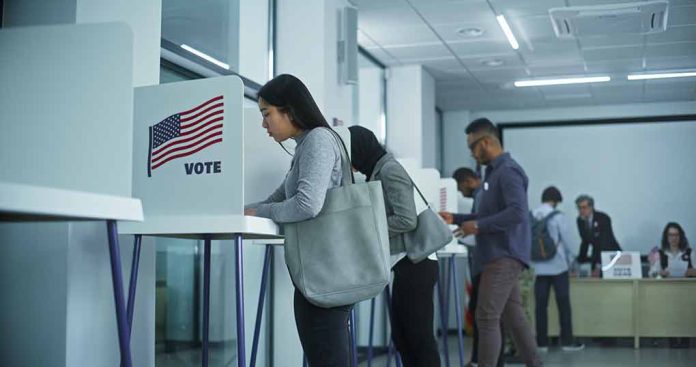
Chinese national who illegally voted in Michigan’s 2024 election has fled authorities and now faces arrest, exposing a brazen election integrity breach in one of the nation’s most competitive battleground states.
Key Takeaways
- Haoxiang Gao, a 20-year-old Chinese national with a green card, faces felony charges for illegally voting and perjury after falsely claiming U.S. citizenship on voter registration forms.
- Gao failed to appear at his court hearing, prompting a judge to issue a bench warrant for his arrest; his current whereabouts are unknown.
- Michigan officials identified 16 noncitizens who voted in the state’s election, raising concerns about potential impact on close races.
- State Rep. Bryan Posthumus is advocating for a constitutional amendment requiring proof of citizenship, citing Gao’s case as evidence of a “giant loophole” in Michigan’s election laws.
- The unauthorized vote cast at the University of Michigan using a student ID cannot be retrieved from the ballot count.
Illegal Vote Cast at University of Michigan
The case of Haoxiang Gao, a 20-year-old Chinese national with a green card studying at the University of Michigan, has ignited fresh concerns about election integrity in one of America’s most crucial battleground states. Gao registered to vote using his University of Michigan student ID to prove residency and falsely claimed to be a U.S. citizen on registration forms. He subsequently cast a ballot at an early voting site at the university campus, a vote that officials confirm cannot be retrieved or removed from the election tally.
Following the election, Gao contacted the Ann Arbor clerk’s office to inquire about the eligibility of green-card holders to vote. During this conversation, he admitted to having lied about his citizenship status. Ann Arbor clerk Jacqueline Beaudry reported that Gao “lied on the forms and attested to being a U.S. citizen,” establishing clear evidence of deliberate voter fraud rather than a simple misunderstanding of eligibility requirements.
“We’re grateful for the swift action of the clerk in this case, who took the appropriate steps and referred the case to law enforcement,” said Michigan Secretary of State Jocelyn Benson and Washtenaw County Prosecutor Eli Savit in a joint statement.
Charges Filed and Bench Warrant Issued
Michigan authorities charged Gao with two serious felonies: being an unauthorized elector attempting to vote and perjury. These charges collectively carry potential sentences of up to 19 years in prison. The severity of these penalties underscores Michigan’s supposed commitment to preventing election fraud, though critics question why verification systems didn’t prevent the illegal vote in the first place. When Gao failed to appear at his scheduled court hearing, a judge issued a bench warrant for his arrest.
“Anyone who attempts to vote illegally faces significant consequences, including but not limited to arrest and prosecution,” warned Benson and Savit. “Let this be clear: Voting records are public – any noncitizen who attempts to vote fraudulently in Michigan will be exposing themselves to great risk and will be prosecuted to the fullest extent of the law.”
Gao’s disappearance raises serious questions about whether these threats of consequences are effective deterrents when enforcement mechanisms clearly failed to prevent illegal voting in the first place. His current whereabouts remain unknown, with no public information available about whether authorities are actively searching for him or if he has potentially left the country.
Broader Implications for Election Integrity
Gao is reportedly one of 16 noncitizens believed to have voted in Michigan, according to a post-election audit. While Secretary of State Jocelyn Benson attempted to downplay concerns by noting these illegal votes “represent 0.00028% of the more than 5.7 million votes cast by Michiganders in the presidential election,” the implications are far more serious than these statistics suggest. In tight races where margins can be razor-thin, even a small number of improper votes could potentially alter an outcome.
“This young man’s case is what showed our entire nation the giant loophole in Michigan’s election laws that allow non-citizens to vote,” said State Rep. Bryan Posthumus, who is advocating for a constitutional amendment requiring proof of citizenship to vote.
The case demonstrates critical vulnerabilities in Michigan’s voter verification procedures. The fact that Gao could register using only a student ID, falsely claim citizenship without verification, and successfully cast a ballot exposes serious flaws in the system meant to safeguard election integrity. While officials emphasize the rarity of such incidents, the ease with which this fraud was committed raises legitimate questions about how many similar cases go undetected or unreported, particularly when the individual involved doesn’t voluntarily contact election officials to question their own eligibility after voting.




